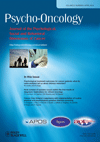Validation of the needs assessment for advanced lung cancer patients (NA-ALCP)
Abstract
Objective: The Needs Assessment for Advanced Cancer Patients (NA-ACP) is a 132-item self-report questionnaire designed to assess the seven needs domains of patients with advanced, incurable cancer. This study aimed to evaluate the short derivative form of that questionnaire with advanced lung cancer patients.
Methods: Item factor loadings, item test–retest data and response distributions were used to retain or reject items from the original NA-ACP scale. This resulted in 38 items being maintained, preserving the original subscales. The response scale was simplified following feedback from patients. 108 people with advanced lung cancer completed the shortened NA-ALCP along with measures of psychological distress (HADS, DT) and quality of life (EORTC QLQ-C30). A-priori predictions were made for divergent and convergent validity.
Results: Internal consistency coefficients were satisfactory for six of seven subscales, range 0.71–0.95. Correlations between NA-ALCP and HADS, DT and EORTC-QLQ-C30 provided support for 11 of the 22 divergent (r = 0.13–0.27) and convergent predictions (r = 0.45–0.71).
Conclusions: Subscales of the NA-ALCP demonstrated internal reliability consistent with the original scale. Results provided supporting evidence for divergent and convergent validity. This study indicates that the NA-ALCP is psychometrically robust, easily understood and one-quarter the length of the original version. Copyright © 2011 John Wiley & Sons, Ltd.




